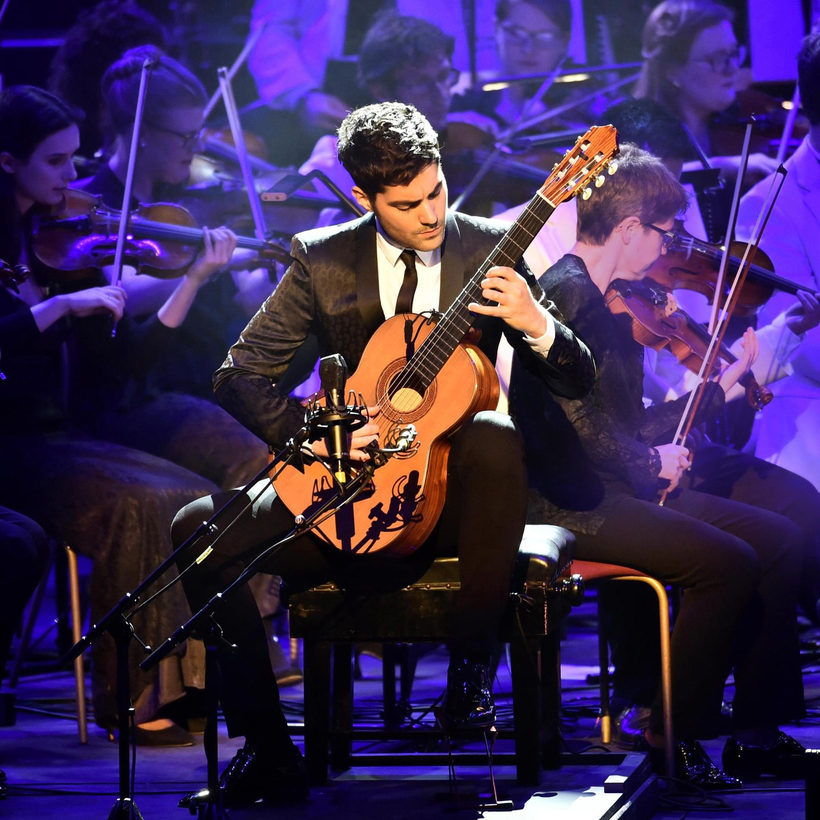“Ten years ago, the only thing I ever saw was the world stage, the travel, the audience all over the place, chart success, appreciation, adoration, et cetera, et cetera. When I look at my life now, all that is completely secondary. And the only thing I really care about now is to be the best musician I can be.”
Miloš Karadaglić, 41, the classical-guitar superstar who goes by the mononym Miloš, was speaking by Zoom from his home, in the London district of Battersea, across the Thames from Chelsea. Where some practiced interviewees dispense print-ready sound bites, this one holds forth in run-on paragraphs alive with the thoughtfulness and passion and independence that carried him, at 17, from his native Montenegro to a full scholarship at the Royal Academy of Music, in London, and on to a storybook career as a concert artist and recording phenomenon.
Miloš was in his late 20s when he put himself on the map with his Deutsche Grammophon debut album, Mediterráneo, in 2011. A year later, he followed up with the first-ever solo-classical-guitar recital in London’s 5,272-seat Royal Albert Hall, the fulfillment of a long-held dream others deemed impossible—and while the concert didn’t quite sell out, it came close. “Oddly hypnotic and quite extraordinary,” The Guardian wrote in a four-out-of-five-star review.
Flash forward to the present, and the chart-topping Miloš discography has swelled to seven wildly eclectic studio releases ranging from the obligatory magnolia-scented Concierto de Aranjuez of Joaquín Rodrigo to an album of transcribed hits of the Beatles. His debut effort under a new contract, with Sony Classical, entitled Baroque, landed last year like the declaration of artistic maturity one might have expected years before.
In keeping with his new philosophy, Miloš prefers a more porous calendar now. “I owe it to the music to play deeply and meaningfully,” he says, “while at all times staying open and vulnerable to the composer and the audience in front of me—even if that means playing less often.”

But it’s not true that he cares only about his own excellence as a musician. In flagrant contradiction of that notion, he recently established, in the trending international hub of Porto Montenegro, the Miloš Karadaglić Foundation—no nursery for Miloš look-alikes but a springboard for dreamers.
“The reason why I was able to have so many opportunities is that on my journey I met people who empowered me, believed in me, gave me the strength to break all those glass ceilings that were being mounted over my head,” he says. “Now I can be there for other talented people out there who have big dreams and something to say and can make this world a better place whether the world wants it or not.”
In its first half-year, the foundation awarded grants to four musicians from the Balkans who are studying abroad. One applicant is a Montenegrin lawyer and mother of two in Rome who makes music as Dolce Hera—“Sweet Hera,” an oxymoronic allusion to the characteristically irate queen of the ancient Greek pantheon and wife of Zeus. And though her music did not figure on the program for the gala launch of the foundation, on April 6, Miloš plans to give her a showcase in Porto Montenegro this summer.
“All her life, she composed and arranged and played drums and jazz and sang,” Miloš says. “She showed extraordinary promise, and we, in a critical moment of her life, were able to make a difference.” Her debut album and a video to go with it are now in the works. “That’s something really big,” says Miloš. “It’s not us. She’s changing her own life, but we were able to facilitate that change at a time when it wouldn’t otherwise have happened.”
Miloš Karadaglić will perform at Wigmore Hall, in London, on June 21. He’ll also make an appearance at “All Things Orchestral,” a Royal Philharmonic Concert Orchestra performance in Hyde Park, on June 28
Matthew Gurewitsch writes about opera and classical music for AIR MAIL. He lives in Hawaii


